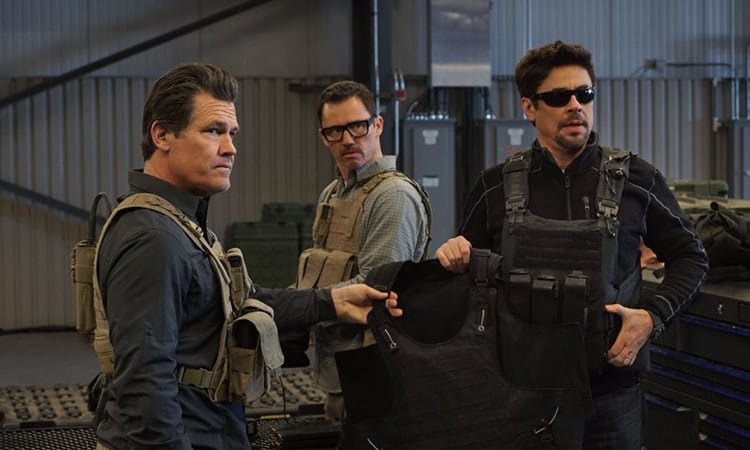Screenwriter Taylor Sheridan seemed invincible. He avoided the pitfalls of a first-time screenplay with “Sicario”, a bleak meditation on the futility of fighting corruption. His follow-up yielded the even better “Hell or High Water”, a neo-Western about brothers in Middle America trying to steal enough money to deal with a broken healthcare system. Now Sheridan is circling back to his genesis with the unnecessary and clumsily titled sequel, “Sicario: Day of the Soldado”.
Nothing about “Sicario” demanded a sequel. It was an exercise in fatalism, seen through the eyes of an FBI agent who had not yet submitted to the brutal determinism of the world around her. By process of elimination, it argued that hope in any institution was in vain, because even virtue signaling groups dip into immorality to maintain their façade. “Sicario” wasn’t just a story about the U.S. government working with a cartel: it was a thematic spider web, suggesting that everyone you support has skeletons wrapped up in their silk cocoons—and that the wealthy, powerful arachnids are the only ones in control.
“Sicario: Day of the Soldado” repeats this message but does nothing to elaborate on it. The sequel’s foray into fatalism is fundamentally flawed. The original needed Emily Blunt’s Agent Macer as a point of view for the audience: with a morally sound protagonist, “Sicario” had a point A to contrast its point B, a position of hope from where hope could be lost. “Soldado” is from the point of the view of the corruptors, so it’s all darkness from beginning to end. The world sucks, we get it.
Protagonists don’t need to be good people, but “Soldado” solicits sympathy for the devils. Those rooting for the titular hitman may have forgotten that he murdered innocent children in cold blood during the last movie. Casting him and Josh Brolin’s detestable CIA operative as protagonists could have been molded into an interesting message, but instead it’s just excessive service to the idea that revenge and power will always lead to death. People suck, we get it.
What’s left is a movie that revels in violence because the world is violent, which isn’t worth watching unless you haven’t felt depressed enough lately. It sorely lacks the visual splendor of “Sicario” as well—next to Denis Villeneuve and Roger Deakins, “Soldado” looks like a low-rent knockoff. What remains from the original are tight plotting and formidable performances: Sheridan’s knack for pacing is only matched by Benicio del Toro’s knack for menace. Despite the movie’s tediously dismal outlook, its narrative and actors keep it moving along at an engaging clip.
Taylor Sheridan has always been an overtly political screenwriter, and though “Soldado” still qualifies as thoughtful entertainment, it seems to be stuck on one thought—a thought that’s been taken to a fearmongering extreme. This film contains the statistically impossible plot point of ISIS terrorists sneaking across the Mexico–U.S. border. Movies aren’t released in a vacuum: “Soldado” comes at a time when both Latino and Arab people are being dehumanized because of views rooted in irrational fear. During my screening, audience members giggled at mentions of torturing these people or killing their families.
Is a decent but unremarkable sequel worth giving money to those kinds of messages? Definitely not.
★★ (2/5)




